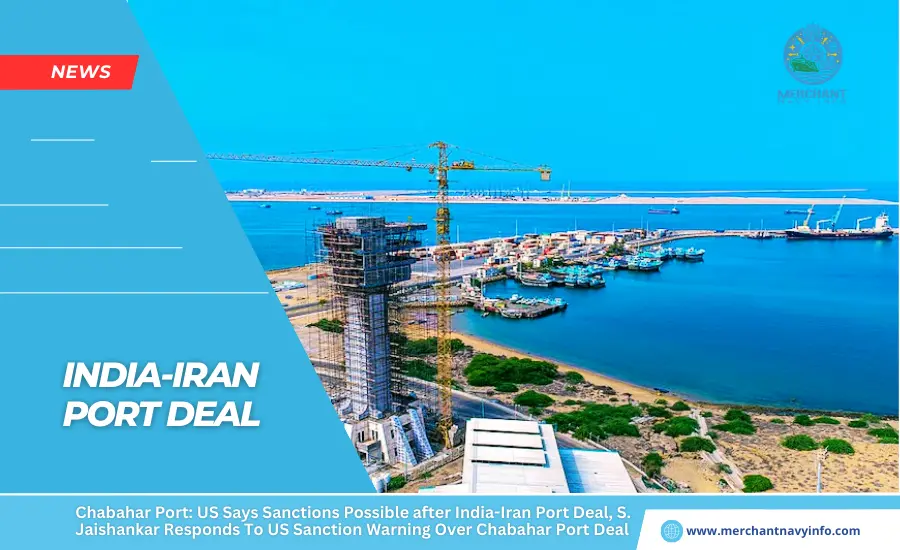
A day after the US warned of a “potential risk of sanctions” after India inked a 10-year agreement to run the Chabahar Port in Iran. External Affairs Minister S Jaishankar highlighted that the project will help the entire region. He said that people should not take a “narrow view” of it.
He also indicated that the US had appreciated Chabahar’s bigger relevance in the past.
The EAM spoke at an interaction on Wednesday after the launch of the Bangla edition of his book ‘Why Bharat Matters’ in Kolkata.
When asked about the US remarks, Mr Jaishankar said, “I did see some of the remarks made. I think it’s a question of communicating, convincing, and getting people to understand that this is for everyone’s benefit. I don’t think people should take a narrow view of it.”
“They (US) have not done so in the past. So, if you look at the U.S. attitude towards the port in Chabahar, the US has appreciated that Chabahar is more relevant. We will work at it,” he added.
Earlier Tuesday, the United States cautioned that “anyone” considering business deals with Tehran must be aware of the “potential risk of sanctions.”
“I would just say US sanctions on Iran remain in place. We will continue to enforce them,” the US State Department Principal Deputy Spokesperson, Vedant Patel, said at the press briefing.
“Any commodity, anyone considering business deals with Iran. They ought to be aware of the potential risk they are opening themselves up to. Also, potential risk of sanctions,” he added.
India-Iran Sign Agreement for Chabahar Port
The Long-Term Bilateral Contract on the Chabahar Port Operation was signed on Monday. It is between Indian Ports Global Limited (IPGL) of India and the Port & Maritime Organisation (PMO) of Iran. The contract enables the operation of Shahid-Behesti port in the Chabahar Port Development Project for ten years.
Mr Jaishankar further said that India had a long association with the project. They could not sign a long-term pact, which was important. He added that New Delhi was able to sort out the issues and sign the long-term agreement. This agreement will benefit the entire region.
“We have had a long association with the Chabahar Port, but we could never sign a long-term agreement. The reason being various problems on the Iranian end the joint-venture partner changes, the condition changed,” the Foreign Minister said.
He added, “Finally, we were able to sort this out and we were able to get the long-term agreement done. The long-term agreement is necessary because without it you cannot really improve the port operation. And the port operation we believe will benefit the entire region.”
The Chabahar Port is an India-Iran flagship project that serves as an important transit port for trade with Afghanistan and Central Asian countries. Both of which are landlocked countries. India has been a key player in the development and operation of Chabahar Port.
The Indian government has invested in the port’s infrastructure. It has been upgrading its facilities to make it a viable transit route for Indian goods bound for Afghanistan and Central Asia.
Long-Term Deal with Iran for Port Development
India entered an agreement in 2016 to develop the strategically important Chabahar port. It is close to Iran’s border with Pakistan.
On Monday, it signed a long-term deal with Iran to develop it further.
India’s shipping minister called it a “historic moment in India-Iran ties.”
However, the move may not be well-received by the US, which has imposed more than 600 sanctions on Iranian-related entities over the past three years.
In a press briefing on Tuesday, the country’s State Department Deputy Spokesperson Vedant Patel said, that the US sanctions on Iran are still in place. When asked about the deal he also said that Washington will continue to enforce them.
“Any entity, anyone considering business deals with Iran. They need to be aware of the potential risks that they are opening themselves up to and the potential risk of sanctions,” he said.
India has yet to respond to the statement.
India took over operations of the port at the end of 2018. The port opened a transit route for Indian goods and products to Afghanistan and Central Asia. Avoiding the land route through Pakistan – neighbors India and Pakistan share a tense relationship.
Officials say 2.5 million tonnes of wheat and 2,000 tonnes of pulses have been shipped from India to Afghanistan through Chabahar port so far.
On Monday, India’s shipping ministry said that the Indian Ports Global Limited (IPGL) and the Port & Maritime Organisation of Iran signed a long-term deal to develop the port.
Under the agreement, IPGL will invest about $120 million with an additional $250 million in financing, bringing the contract’s value to $370 million, said Iran’s Minister of Roads and Urban Development Mehrdad Bazrpash.
India’s Foreign Minister S Jaishankar said the deal “will clear the pathway for bigger investments to be made in the port.”









